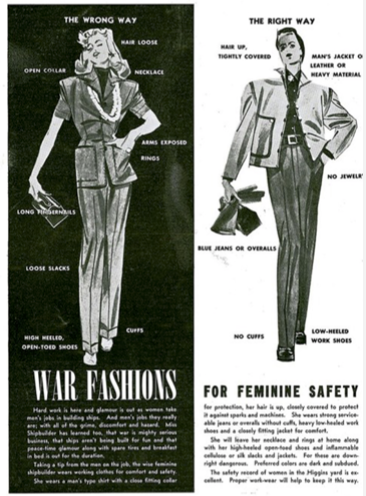Use your power words
Can we talk about something that’s been eating me up inside?
I am very conscious of the power of words.
From the words our parents use to communicate with us as children to the words our friends use to engage us today, the words used around us continuously shape our individual senses of self.
(Unfortunately, psychologists have found that the subconscious is very literal.)
Hopefully your parents didn’t tear you down, calling you a “waste of space”. Hopefully they built your self-confidence by calling you “a thoughtful, intelligent kid.” (For the record, I’m so sorry if the former…and I hope the therapy is working.)
Either way you live with the effects of those words.
So the thing that’s eating me up these days is women’s use of words.
Specifically: power language.
“What’s that?” you ask.
Well, think of power language like the shoulder pads in a woman’s power suit. Those icons of structure and stiffness really took hold in women’s fashion going back to WWII, connecting to a shift in gender roles that was happening when women began entering the workforce.
Women needed to fit in with the male-dominated industries. In the 1980s, the shoulder pads came back as the number of women in the workforce rose dramatically again.
In an effort to blend in with men at the office, came the rise of so-called “power dressing”. It was fashion’s effort to set women up to look the part of a business professional.
Power language would be the words women use to sound like a professional, too.
So why did no one ever teach women how to SPEAK the part?!
(Sorry, I don’t mean to yell.)
NO! WAIT! I DO mean to YELL!!!
Raising my voice. Asserting my knowledge. Advocating for my informed opinion. Announcing myself with authority in a meeting is as much as my right as anyone else’s, and yet no one ever told me that was a major part of the deal in establishing my place at the table.
I don’t mean to say there aren’t considerate men out there or that there aren’t women who work their power like a stallion, but mostly, the behaviors that would serve women successfully in business are somehow ones they aren’t taught.
Women are actively taught to be nice, even at their own expense.
Women are expected to be docile, not incite conflict.
Women are encouraged to be team players, not leaders.
Women (né, all females) should be actively taught the time and place to advocate for themselves, too!
Women ought to be taught to hold their ground.
Women ought to be taught that holding true to a position you feel strongly about is not explicitly aggressive or unfeminine behavior. It’s powerful.
Power isn’t a gendered noun.
There were some fascinating articles written a few months into the COVID-19 world pandemic about the differences in the results of women-lead countries vs. male. This New York Times article, for example, teases apart the traditional characteristics of power in leadership.
“There is an expectation that leaders should be aggressive and forward and domineering. But if women demonstrate those traits, then they’re seen as unfeminine,” said Alice Evans, a sociologist at King's College London who studies how women gain power in public life. “That makes it very difficult for women to thrive as leaders.”
But the power language women need to be taught is not that. It’s not about shifting the language they would naturally use, it’s about embracing the instincts and knowledge they already have. When Prime Minister Jacinda Ardern announced that New Zealand’s lockdown was over because they had effectively eradicated the Coronavirus from the country, she signaled to the world the power of inclusivity, “…varied information sources, and leaders with the humility to listen to outside voices.”
If power dressing is like putting on armor, power language is your sword.
Much like today’s power dressing, asserting yourself in a room isn’t about being overbearing, but it is about bringing the most confident and authentic version of yourself, without apology, to the table.
Prime Minister Ardern addressed her country via Facebook Live, wearing a sweatshirt (no shoulder pads), and apologized about the alarming nature of the emergency alert. She did not apologize for the action of putting her entire nation in lockdown. See the difference?
Baby steps to own your power.
If someone offers you a compliment, say “Thank you.”
If someone challenges your position, defend it.
If someone offers you an opportunity, take it.
If someone takes credit for your work, say “You know, that was one of those projects I spent a really long time developing. Thanks for bringing it up.”
I’m not advocating for changing who you are, but to stand up for your position.
The world needs your voice, your words, and your power at the table for all that is coming we have yet to encounter.

